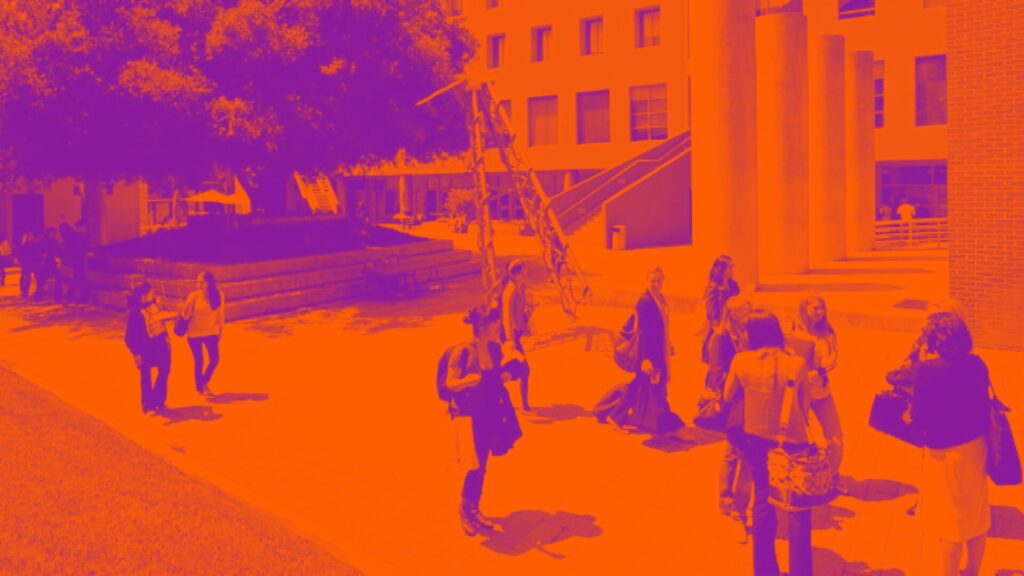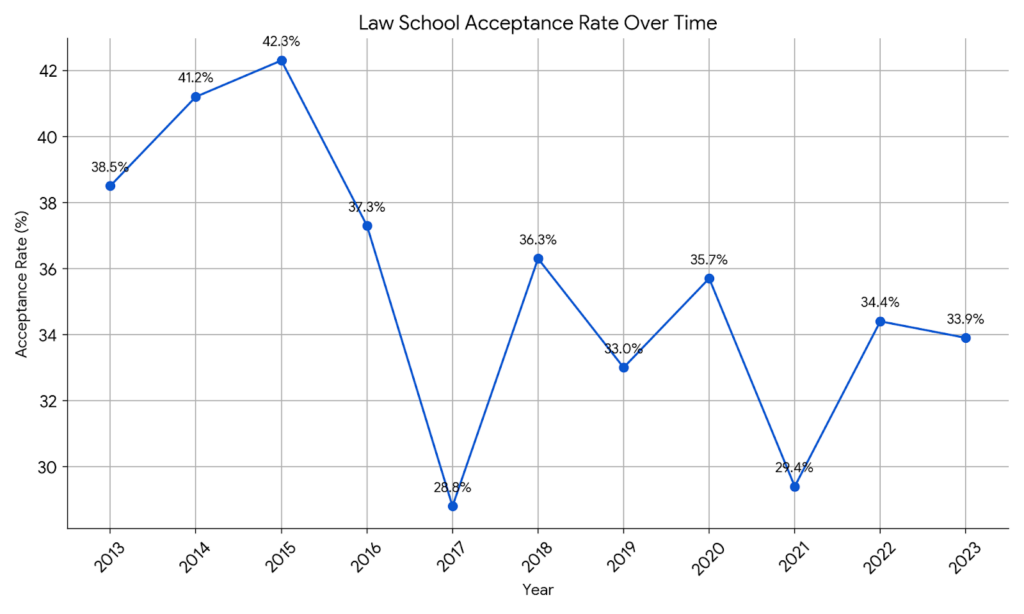Introduction
Based in Los Angeles, Loyola Law School is dedicated to the ideals of social justice and public interest law. This focus brings many students from across the US who are interested in law for community-oriented reasons to the program. If you are still looking for a school that will best fit you, understanding the admission statistics and process is invaluable. The valuable information gives you an idea about how many applications are competing for spots in the incoming class and the admission standard you have to expect.
In this article, you’ll get an in-depth look into the Loyola Law School acceptance rate. We will discuss the multiple variables that go into your application and share specific ways to optimize your chances of admission. With this information in mind, you will be well-positioned to develop a compelling Loyola Law School application and join the community of inspiring students committed to using law for the greater good.

Is Loyola Law School Hard to Get Into?
The Loyola Law School Acceptance Rate is 33.9%. While a 33.9% acceptance rate might appear easy with respect to T-14 schools with acceptance rates below 20%, Loyola is still a selective school. You will need stellar academics like a strong GPA and a high LSAT score. Numbers alone won’t cut it though.
Loyola Law School seeks well-rounded potential lawyers who participate in outside activities, have pertinent real-world experience, and a demonstrated dedication to social justice evidenced by a powerful, authentic narrative. Getting admitted requires an outstanding application that convinces them you have the qualifications and passion to thrive at a school so focused on public interest law. It’s certainly achievable for top-notch students willing to put in the work.
Factors Influencing the Loyola Law School Acceptance Rate
The acceptance rate fluctuates based on application volume and the overall strength of the current applicant pool. There are several key things that affects the Loyola Law School acceptance rate each year. Let’s explore them one by one:
School Reputation & Rankings
First up is the school’s reputation and Loyola Law School rankings. Loyola’s solid #61 rank in Best Law Schools and #6 spot for Part-time Law programs give it significant prestige. The better a school’s reputation, the more students will want to attend, increasing the application numbers and making it tough to get accepted.
Here are the Loyola Law School rankings:
| Law School Program Rankings | Rank |
| Best Law Schools (Overall) | 61 |
| Part-time | 6 |
| Business/Corporate Law | 57 |
| Clinical Training | 46 |
| Constitutional Law | 62 |
| Contracts/Commercial Law | 64 |
| Criminal Law | 34 |
| Dispute Resolution | 57 |
| Environmental Law | 94 |
| Health Care Law | 41 |
| Intellectual Property Law | 44 |
| International Law | 59 |
| Legal Writing | 40 |
| Tax Law | 13 |
| Trial Advocacy | 8 |
Application Volume
The total number of applications received each cycle is a major determinant of the Loyola Law School acceptance rate. If Loyola receives many applications due to increased visibility or other factors, it becomes much more selective purely based on the high volume compared to the limited class size. More applicants mean more competition and a lower percentage can be admitted. Conversely, a smaller applicant pool allows them to accept a higher rate.
Academic Records
Your academic record, including your undergrad GPA, is one of the biggest make-or-break factors. Your undergrad GPA mirrors your ability to handle rigorous law coursework. The median GPA for admitted Loyola students is 3.71. Scoring at or above that median puts you in a strong position. Anything lower and you’ll need to compensate with other impressive qualifications.
Here are the median GPAs of admitted students at Loyola Law School:
- 25th percentile GPA: 3.51
- 50th percentile GPA: 3.71
- 75th percentile GPA: 3.83
LSAT Scores
Just as important is your Loyola Law School LSAT score. The LSAT score is important because it serves as a standardized measure of a candidate’s potential to succeed in law school, assessing their ability to analyze complex arguments and apply logical reasoning skills, which are essential for legal practice.
What LSAT score do I need for Loyola Law School? Loyola’s median LSAT for admitted students is 161 for Fall 2023 entry. Hit that 161 and you’re looking good. Below it, and you’ll have to make up for it elsewhere in your application.
Here is the list of LSAT median of Loyola Law School:
- 25th percentile LSAT score: 157
- 50th percentile LSAT score: 161
- 75th percentile LSAT score: 163
Thoroughly preparing with our LSAT Prep Course can improve your LSAT score considerably. We will go through the LSAT sections, identify your gaps, and implement a study strategy to elevate your performance. Odyssey Test Prep has helped many students achieve a high LSAT score. We can also do the same to you – help you achieve the LSAT score you desire and get admitted to your dream law school!
Diversity Goals
Finally, Loyola really emphasizes building a diverse student body. They’ll consider things like your background, race, life experiences, and how you can contribute a unique perspective to the community. Showing your value in this respect can definitely increase your chances.
Trends in the Loyola Law School Acceptance Rates Over the Years

The Loyola Law School acceptance rate has exhibited considerable variation across different admissions cycles in the past decade. One of the lower points occurred in 2017 when the rate dipped to 28.8%, indicating fierce competition among applicants that year.
In contrast, the highest rates were observed in 2015 and 2014 at 42.3% and 41.2% respectively, allowing Loyola to admit a higher proportion of candidates. These varying rates from year to year represent the shifting strengths of each incoming Loyola Law School class profile and levels of competition for admission.
One effective way to bolster your application is by achieving a high LSAT score. Achieve a high LSAT score and get accepted to Loyola Law with the help of a top-ranked LSAT prep course. Odyssey Test Prep offers structured prep courses available online and in person with flexible hours convenient for your schedule. Through a combination of interactive lessons, practice tests, and personalized feedback, we will help you master the key concepts and strategies needed to excel on the LSAT and get admitted to your choice of law school.

Loyola Law School Requirements
The school has several key application requirements you need to fulfill in order to be considered for admission. Here’s the admission checklist of what you’ll need:
1. Submitting Your Application Online
To apply to Loyola Law School, you’ll go through the LSAC website. The LSAC is kind of the middleman for law school applications. It’s where you will register for the LSAT exam and submit all your main application materials electronically, like your personal statement, transcripts, and recommendation letters. The LSAC collects it all and sends it to Loyola.
2. LSAT/GRE Requirement
Loyola Law School offers two standardized tests – the LSAT (Law School Admission Test) and the GRE (Graduate Record Examinations). These exam scores constitute a significant portion of your application. The one exception is if you are applying to Loyola Marymount University through their Direct Admission pilot program – you can submit SAT or ACT scores.
There are a few extra steps if going the GRE route. You will be required to register with LSAC and provide a GRE Certification Statement independently. However, you have to take note that many law schools prefer the LSAT over the GRE because it specifically evaluates skills such as critical thinking and logical reasoning that are directly relevant to the study and practice of law, whereas the GRE is a more general test intended for a broader range of graduate programs. In addition, Loyola recommends taking either test by no later than January 2024. That is because they accept applications on a rolling basis, so a higher score earlier helps you both in admissions and in scholarships!
3. Personal Statements
The purpose of your law school personal statement is to convey information beyond numbers. Use the page limitation to provide writing samples along with reflections on your experiences, motivations, and personality, giving readers an idea of the character behind the application while establishing your ability to write clearly and compellingly.
In addition to this required statement, you can optionally submit two more short statements. The first is a Background/Identity Statement (2 pages max) where you can discuss your unique experiences, perspectives, and how you’ll contribute to campus diversity. The second is an Interest in Law Statement (1 page) explaining what drew you to the legal field. These are opportunities to stand out.
4. Letters of Recommendation
One law school letter of recommendation is required, but you can submit up to 2 in total. These letters, sent through LSAC, allow a third-party perspective on your academic skills, work ethic, and character traits. Ideally, these come from professors or others who can speak to your academic potential. Employer recommendations work too, but avoid getting letters from family or friends.
5. Resume
As part of your application packet, you’ll need to include a law school resume summing up your academic and professional experiences so far. Keep it nice and concise – no more than two pages. Use this resume to list out things like your education, jobs/internships you’ve had, extracurricular activities, volunteer work, etc. Anything relevant that shows your capabilities.
6. Academic/Test Score Addendum (Optional)
If there were special circumstances like illness or emergency that seriously impacted your grades or test scores, you can submit a short addendum explaining the situation. Keep this addendum focused just on providing context for that academic issue and how you have overcome the situation.
How to Boost Your Chances of Admission to Loyola Law School
There are several strategies that can strengthen your Loyola Law School application. Let’s explore some key ways to make you stand out:
Aim for Academic Excellence
Your undergrad GPA carries a lot of weight at Loyola. Aim for the 3.71 median GPA to have more advantage. A high GPA shows that you are intelligent and disciplined enough to survive the law school demands. It shows that you can handle learning difficult subjects and performing continually well in them.
Prioritize Taking the LSAT Over the GRE
While Loyola accepts both the LSAT and GRE for test scores, the LSAT is still the preferred exam for law schools. It’s specifically designed to test skills relevant to legal studies like logical reasoning, writing, and reading comprehension. A competitive LSAT score of 161 or higher (Loyola’s median) can be a major boost to your application and the Loyola Law School acceptance rate.
Master the LSAT with the guidance of LSAT tutors who scored 170+ on the official LSAT. Our expert LSAT tutors will identify your weak areas and get you up to speed. Plus, our prep materials are already updated for the new Analytical Reasoning section changes coming in August 2024. We’ll make sure you’re ready for the new LSAT format and help you maximize your scoring potential across all sections.
Showcase Relevant Experience, Leadership, and Community Engagement
Having internships, jobs, or volunteer roles that expose you to the legal world is a major plus. These experiences signal your genuine interest in the field and let you develop transferable skills for law studies. Loyola also loves to see applicants who have taken active leadership roles and given back to their communities through service and volunteer work. It shows you have the drive to get involved and make positive impacts – qualities very valued at the law school.
Stay Organized and Follow Directions
Don’t give the admission committee any reason to knock points off by missing components or instructions. We recommend submitting materials well before the deadlines to be safe. Our consultants can create a personalized admission roadmap ensuring your entire application package is prepped to perfection and submitted properly according to the school’s guidelines.
Craft a winning law school application with expert guidance from law school admissions consultants. To better assist you in your law school application, our admission consultants can provide invaluable guidance to help you create a standout application for Loyola Law School. From polishing essays and interview preparation, they also evaluate your full profile to identify scholarship opportunities aligned with your qualifications and provide guidance on crafting compelling materials.
Final Thoughts
Being aware of the Loyola Law School acceptance rate is vital knowledge for prospective students. This rate serves as a benchmark, indicating just how competitive Loyola’s admissions process can be. By understanding the level of selectivity, applicants can realistically assess their chances and develop an appropriate strategy to strengthen their candidacy.
While the Loyola Law School acceptance rate fluctuates, it consistently hovers around the mid-30% range – more accommodating than elite programs, yet still highly selective. Submitting a standout application that showcases strong academics, test scores, recommendations, and compelling personal statements is crucial for improving admission prospects.
To assist you in this journey, we encourage you to try our 3-week LSAT Free Class. This offering provides a firsthand experience with our exceptional instructors, study resources, and learning approach before any commitment.
Schedule an LSAT Free Consultation today if you have any admission or LSAT prep concerns!

